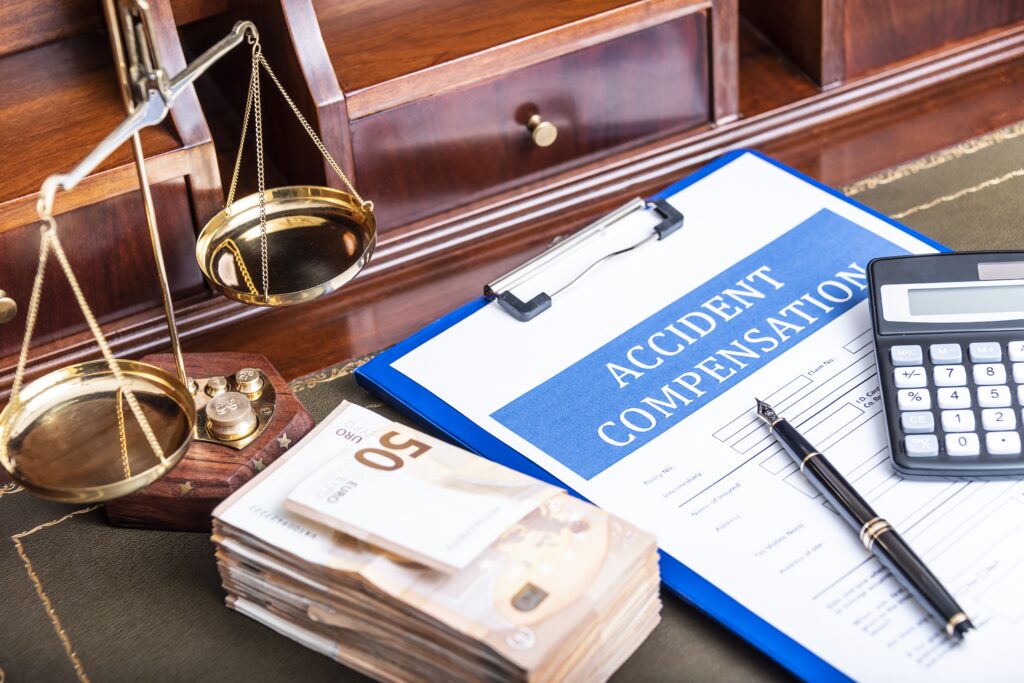Personal injury claims and lawsuits arise when individuals behave negligently. For example, someone might drive carelessly or irresponsibly under the circumstances, or a premises owner might fail to maintain their property in a reasonably safe condition for the benefit of property visitors. If an individual becomes injured due to someone else’s negligence, they can file a personal injury claim or lawsuit against the negligent party for the monetary recovery they deserve.

Suppose you recently sustained injuries in an incident that resulted from another person’s careless or reckless behaviour. In that case, immediately speak with a personal injury lawyer in Alberta area.
Your lawyer can discuss your accident with you in detail and determine your legal options. For example, you can file a personal injury claim with the responsible party’s insurance company or a lawsuit against the negligent individual in the court system.
Your lawyer can guide you through every step of the process and recover the maximum damages you deserve to recover for all your accident-related injuries and complications.
How Do Personal Injury Claims Arise?
Personal injury claims happen when other parties behave negligently, which means they act unreasonably under the circumstances.
Some of the most common types of occurrences that happen when other individuals are negligent include:
- Motor vehicle accidents, including accidents that involve cars, trucks, motorcycles, bicycles, buses, and other vehicles
- Negligent security incidents, where a property owner fails to ensure an adequate security presence on the premises
- Slip-and-fall accidents
- Medical negligence and malpractice
- Construction site accidents
- Workplace occurrences
- Boating accidents
- Swimming pool accidents
- Fair/amusement park accidents
Accident victims can also suffer debilitating injuries that require them to undergo prolonged medical treatment.
Some of the most common injuries that result from others’ negligence include soft tissue neck and back contusions, including whiplash injuries, rib fractures, bone fractures, internal organ damage, internal bleeding, eye injuries, mouth and teeth injuries, traumatic brain injuries, spinal cord damage, complete and incomplete paralysis injuries, and death.
If you suffered any of these injuries in an accident that was not your fault, a personal injury lawyer can determine your legal rights and eligibility to file a personal injury claim or lawsuit against the at-fault individual or entity. If you can move forward, your lawyer can handle your case throughout the process and work to obtain favourable monetary compensation via settlement or litigation.
Elements of Proof in a Personal Injury Lawsuit
In a personal injury claim or a lawsuit, the insured accident victim must first satisfy their legal burden of proof to recover monetary compensation for their injuries.
First, the accident victim must prove that the other party owed them some legal duty of care. For example, in the context of a slip and fall claim, property owners owe property visitors a duty to take reasonable action to warn about or repair known dangerous defects on the premises they know about.
Similarly, in a motor vehicle accident scenario, car drivers have a duty to follow all traffic laws and refrain from distracted and intoxicated driving.
Next, the injured accident victim must demonstrate that the other party violated their legal duty. For example, a property owner, despite knowing about a hazardous condition on their property, might not have repaired the situation within a reasonable amount of time or placed warning placards in the vicinity within a reasonable timeframe. Similarly, a driver might have violated a traffic law or driven while under the influence of alcohol or drugs.
In addition to proving the duty of care and breach elements, the injured accident victim must also demonstrate that the incident occurred as a direct result of the other party’s negligent or reckless behaviour.
Finally, they need to show that they sustained one or more physical injuries as a direct result of the incident. To establish this last element, they will typically require a report from a medical provider who treated them or who is serving as an expert in their case.
Based on a reasonable degree of medical probability, the provider must state that the injury or injuries in question directly resulted from the incident.
An experienced personal injury lawyer in your area can establish your legal burden of proof, making you eligible to recover the monetary compensation you deserve in your case. Your lawyer can also retain one or more experts who can testify in your case, either at a deposition or civil jury trial.
Filing a Personal Injury Claim
Before filing a personal injury lawsuit and litigating a case in court, your lawyer will likely file a claim with the at-fault party’s insurance company. However, your lawyer might need to file a lawsuit immediately if your case’s statute of limitations is running short.
When filing a personal injury claim on your behalf, your lawyer will include a settlement demand letter that demands a certain amount within the applicable insurance coverage limits. In addition, your lawyer will include various documents in a settlement demand package.
Those documents may include:
- Medical treatment records
- Lost-wage documents from your employer
- Prior tax returns, if you are claiming lost earnings or loss of earning capacity
- Photographs of your injuries
- Pictures of the occurrence scene
- Property damage photographs
Once the insurance adjuster handling your claim reviews these documents, they will decide whether to accept fault or liability for the subject occurrence. If the insurance company accepts fault, your lawyer can begin settlement negotiations with the adjuster.
Obtaining a favourable personal injury settlement offer from an adjuster is often an uphill battle. This is because insurance companies have absolutely no incentive to fairly or fully compensate accident victims for the compensation they truly deserve. This is because insurance companies, as big businesses, want to try to save themselves as much money as possible.
One way they accomplish this goal is by paying out the smallest amount of monetary compensation possible to injured accident victims. However, your lawyer can aggressively negotiate with the adjuster on your behalf and, if necessary, proceed to courtroom litigation if they refuse to make a favourable settlement offer.
Your personal injury lawyer can determine and advise whether a particular settlement offer from the insurance company is worth accepting, given the facts and circumstances of your case, as well as the severity of your injuries.
If you decide to settle your personal injury claim, your lawyer can handle all the necessary steps to finalize the process. Alternatively, your lawyer can file a lawsuit on your behalf in the court system and begin pursuing a favourable litigation award on your behalf.
Steps in the Litigation Process
Litigation in a personal injury case begins when a lawyer files a lawsuit in the court system on behalf of the injured accident victim. Accident victims have only two years from their accident to file a personal injury lawsuit that seeks monetary compensation.
Therefore, retain experienced legal counsel as quickly as possible in the process. If an accident victim files a lawsuit after the statute of limitations time frame expires, they can no longer recover any monetary damages, absent a few minimal circumstances.
After filing a personal injury lawsuit in the court system, the parties will take part in a process called discovery. During this time, the parties will exchange answers to written interrogatories and may take one another’s deposition.
During a deposition, the defence lawyer in your case will likely ask you about the accident, your injuries, and any other complications you might have experienced due to the accident and your injuries.
Following a deposition, the insurance company adjuster may increase their offer. However, this does not always happen. If the settlement offer does not go up, then the parties will continue litigating their case. For example, the court may require the parties to appear at a settlement conference so they can make additional efforts to settle the case.
If the personal injury case does not reach a resolution at a pretrial/settlement conference, the parties will likely take the case to a civil jury trial. During a jury trial, your lawyer can call you to the witness stand to testify, introduce medical records and other evidence on your behalf, call additional fact witnesses, and make a closing argument.
The defence lawyer will also have an opportunity to cross-examine you during the trial. After your trial, the jury will deliberate and decide what, if any, monetary damages to award you for your accident-related losses.
Instead of taking your case to a jury trial, you can explore various alternative dispute resolution (ADR) options. For example, you can take your case to mediation, where a neutral mediator will facilitate settlement discussions with the at-fault party’s insurance company.
Alternatively, you might decide to pursue binding arbitration, where the parties will introduce evidence before a neutral arbitrator who decides the case outcome. Unlike a civil jury trial, a binding arbitration hearing occurs outside the courtroom.
Your personal injury lawyer can advise which option you should pursue to maximize your monetary recovery in the case.
Recovering Monetary Damages in a Personal Injury Case
If you can successfully prove the legal elements of your personal injury lawsuit, you may recover different monetary damages for your accident-related losses. First, if you had to take time off work to attend medical appointments and recover from your physical injuries, you can pursue lost-wage compensation as part of your claim or lawsuit. Additionally, if you had to take a pay cut and switch jobs due to your injuries, you can pursue monetary recovery for loss of earning capacity.
Additionally, you can recover monetary damages for your intangible losses, including compensation for past and future inconvenience, pain and suffering, emotional anguish and mental distress, loss of spousal consortium, loss of the ability to use one or more body parts (for example a full or partial paralysis injury), lost quality of life, permanent disfigurement or disability.
Your lawyer can maximize the monetary damages you recover by aggressively advocating for you during settlement negotiations with insurance company representatives and, if necessary, litigating your case in the court system.
If your case must go to a civil jury trial or ADR proceeding, your lawyer will aggressively advocate for you and introduce evidence to support your claim.
Talk to an Experienced Personal Injury Lawyer Right Away
Sometimes, people make the mistake of thinking that their accident case is straightforward and they don’t need a personal injury lawyer or can’t afford one.
This is nearly always a mistake.
- First, car accident lawyers typically work on contingency, meaning they collect a portion of what their client gets. The client doesn’t pay out of pocket.
- Second, if an insurance company can find a reason not to pay an accident victim money, they will use that reason not to. The best way to prevent this is with professional representation.
If you recently suffered injuries in an accident that someone else caused, time is of the essence. In general, the sooner you retain legal counsel to represent you in your case, the more likely you will recover total and fair monetary compensation for your accident-related losses.

Your personal injury lawyer can aggressively advocate for you throughout every step of the case, including gathering the necessary documents, negotiating with insurance company representatives, and finalizing your case settlement. If you decide not to settle your case immediately, your lawyer can file a lawsuit on your behalf, litigate your case through the court system, and represent you in all legal proceedings.
Finally, at every stage of the process, your lawyer can advise you of your rights and guide you to make intelligent and informed decisions to maximize your total monetary award.
Whether you need to file a lawsuit in your personal injury case or not, the right legal representation can protect your rights and future.
